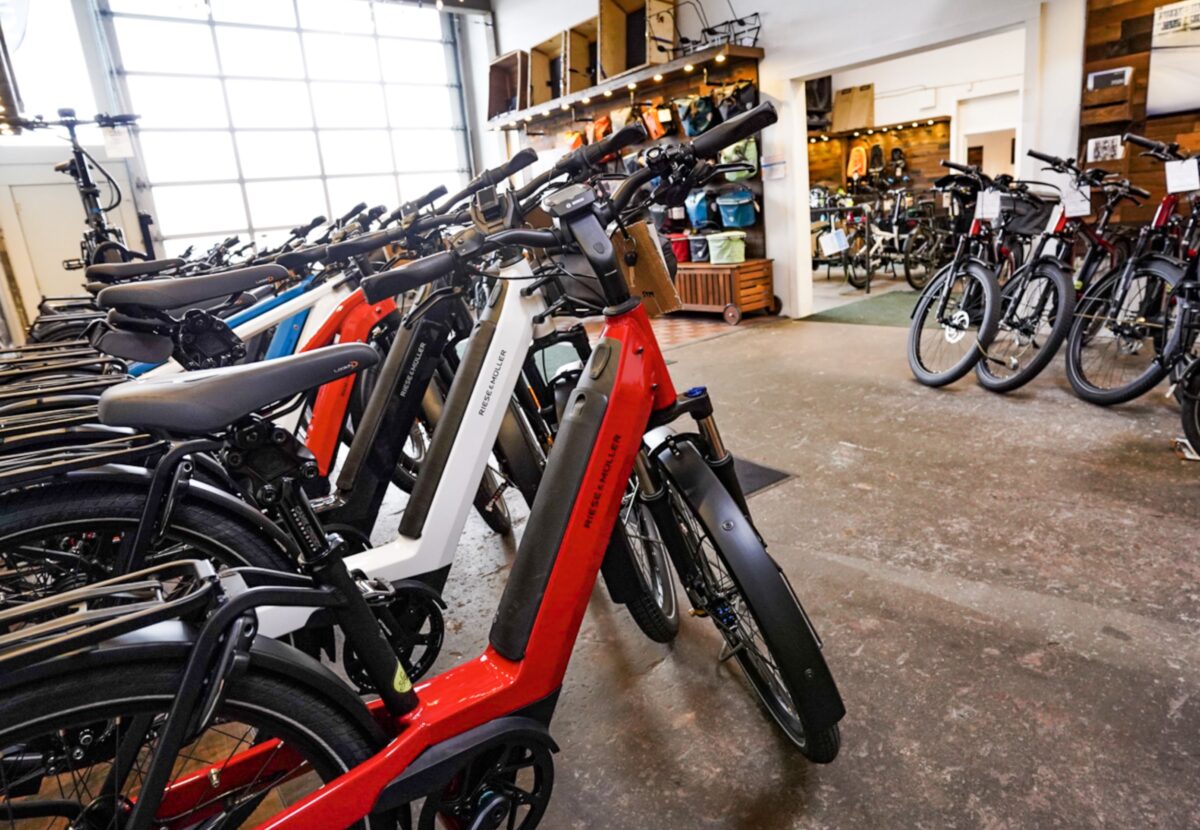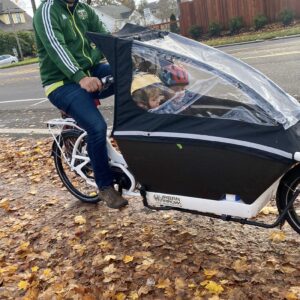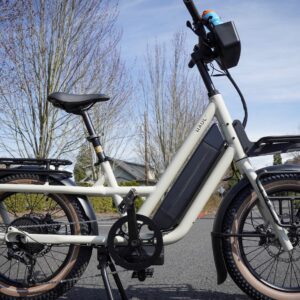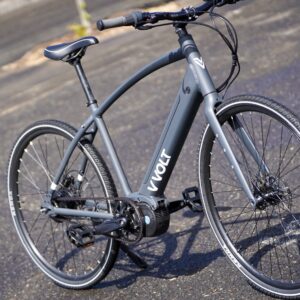
Oregon’s electric bike rebate bill has been rescheduled for its first public hearing. House Bill 2571 was initially slated to be heard in the House Committee On Climate, Energy, and Environment this past Monday (1/30), but it was pulled off the agenda just before the meeting. It’s now set for a hearing on February 8th at 3:00 pm.
The bill is sponsored by House Representatives Dacia Grayber, Mark Gamba, and Khanh Pham. It would establish a cash rebate of between $1,200 and $1,400 at the point-of-sale for the purchase of a new e-bike from a qualifying dealer. Oregon already offers several generous purchase incentives for people who want to buy electric cars, so a similar program for bicycle EVs seems like a natural next step. The bill asks for $6 million from the state’s general fund to kickstart the program.
One of the reasons HB 2571 was pulled from the agenda last week was so lawmakers could have time to read and digest a landmark new report on electric bicycle, scooter and “e-micromobility” vehicles that was recently released by the Oregon Department of Transportation. That report, part of ODOT’s larger Transportation Electrification Infrastructure Needs Analysis, includes a recommendation for rebates and other incentives to encourage more Oregonians to buy e-bikes. The past week has also given lawmakers and other supporters of HB 2571 more time to burnish their arguments and organize testimony.
Next Wednesday’s hearing won’t come with a vote, but it will be the first time we get to hear how those arguments are shaping up, what lawmakers think about the idea, and if there are any voices of opposition that have come out of the woodwork. So far the Oregon Legislature website has three pieces of written testimony for the bill — all of which are in support.
Northeast Portland resident Paxton Rothwell says he recently had to sell his car because the payments made it unaffordable. “An e-bike would change my life,” states his testimony. “I would be able to comfortably take 95% of trips by bike. I would be able to… make a large grocery run, and reach further distances in the city if I had access to an e-bike. But I don’t. And the main reason I don’t is because I can’t afford the purchase. I support HB 2571 because it would give me and people like me the opportunity to afford this amazing transportation tool.”
Andrew Martin writes that, “Oregon currently has rebates for electric cars, and given that electric bicycles move us towards our goals much faster it makes sense to have similar rebates for electric bikes. This rebate will also support Oregon’s bicycle industry economically.”
And Mark Harris tells lawmakers that, “I am an avid bike rider in my 60’s and would jump at the chance to buy an electric bike to use on my commute. I feel I would use it instead of the times I have to drive my car.”
View the agenda for the committee meeting to learn how to watch the hearing, testify in person, or submit your written testimony.






Thanks for reading.
BikePortland has served this community with independent community journalism since 2005. We rely on subscriptions from readers like you to survive. Your financial support is vital in keeping this valuable resource alive and well.
Please subscribe today to strengthen and expand our work.
Annoyed to see this
It reads as “the bad things about cars is the gas” – leaving out the 40,000+ people per year who die on the roads, the particulate emissions from tires, the environmental cost of road building and maintenance, the social cost of car dependency, etc.
I’m worried that once EVs reach “critical mass” that we will start walking back our VMT reduction goals. Which will almost certainly make the roads more dangerous for the intrepid cyclist. I would hope that there would be some political impetus for actually making good on Vision Zero but the world does continue to disappoint me.
The cited hypothetical model utilizes multiple arbitrary inputs and does not reflect a real-world statistical survey. This model reports a ~12% reduction in car VMT at a modeled 15% e-bike mode share. I have no idea where the claim of a ~33% reduction comes from and its disappointing to see it quoted as fact on BP.
https://www.sciencedirect.com/science/article/abs/pii/S1361920920306696?via%3Dihub
I was just trying to point out a relevant bit of analysis. I wasn’t quoting anything “as fact”.
That being said, it’s a distraction from the real focus of the story, so I deleted it. If folks want to read the story I linked to here it is https://ggwash.org/view/88025/analysis-e-bike-subsidies-are-more-cost-effective-than-ev-subsidies
This is good news.
My neighbor up the street who lives in a $900,000 home and owns 2 cars (one is an $80,000 Tesla), says if this passes he will buy one.
You all can help him pay for his nice new e-Bike.
I’m glad we can all help get e-bikes to people who wouldn’t otherwise get them, for whatever reason! Maybe your neighbor will ride it sometimes – maybe even replace some car trips with it, since he wouldn’t have to find parking for his $80,000 Tesla, or worry about it getting stolen/damaged. Maybe it’ll sit unused in his garage until he sells it for cheap to clear up space later. Who knows?
I do know that the bill will also help people who actively want an e-bike and can’t afford one without help get one, which is great. It’ll cost the state less, and be more accessible to more people, because there isn’t means testing.
It really is good news.
” Maybe it’ll sit unused in his garage until he sells it for cheap to clear up space later. Who knows?”
Excellent use of tax payer money.
Oh good, once again, we’re in agreement! It is an excellent use of tax payer money, compared to wasting it on spinning up a bureaucracy that eats money keeping a few wealthy people and a whole lot more not-wealthy people from getting bikes that they’ll probably ride.
Is your neighbor going to get an e-bike just to show everybody that he can waste public money by never riding it? Seems like theorizing about this edge-case focuses on a tiny, potential negative to the exclusion of a much larger positive.
If you’re a fan of efficient uses of taxpayer money, then you must really hate all the freeway widening happening on the taxpayer’s dime, right? There’s probably more bang for buck in fighting multi-billion-dollar highway mega-projects than nit-picking a six million dollar bill to help people get around without cars.
No one is riding these things AJ. Do you actually ride a bike around town?
They all sit in garages…
I bet you could google an answer to this, unless this question is just rhetorical trolling in support of a weak argument. That’s not a question; you don’t have to provide a response.
Oh, and my family is a one car family because we own an ebike, and I ride it almost every day. I only utilize a car for trips over 10 miles, and then, only when absolutely necessary.
My 70 year old MIL is ordering an e-trike next week. She’ll be using it to increase her physical activity (and probably prolong her life with her now 4yo grandchild), and we’ll be borrowing it for long family bike rides and when we have company over.
I’m thankful that my family can afford to pay full price, though not without a bit of financial planning and justifying cost of ownership with other more expensive modes of transportation. If lower-income folks have a door to e-bike ownership open to them, especially compared to expensive and dangerous heavy automobiles, cool. Thanks for using my tax dollars in this way.
In the midst of this so-called e-bike revolution Portland cycling mode share has plummeted by ~40% from its 2014 peak (Census ACS 1 yr). My anecdotal experience is the same as dwk’s — bike lanes that were once full of people are now empty during commute hours. The disappearance of a safety-in-numbers effect has increased inattention and misbehavior by motorists — and this affects me personally. The unwillingness of many cycling aficianados to acknowledge that transportation cycling in Portland is in crisis is a maddening form of toxic positivity.
The context of this thread is an argument to means-test a bill to provide subsidies for e-bike purchases. Who here is saying Portland cycling is doing just fine and all is well?
Is Portland mode share way down? Yes! Should we be holding the city and regional governments’ feet to the fire to get better active transport infrastructure and stop pandering to private vehicle owners? Absolutely! Does that conflict with a bill to help people buy e-bikes? It sure doesn’t seem like it to me.
Having more people with bikes who ride them will increase both safey-in-numbers and pressure for better cycling infrastructure. Do you think fewer people on bikes is the answer to a plummeting mode share?
Ebikes have been around for awhile and they are not getting ridden. I want people on bikes but paying most of the cost for bikes that are not being used is a complete waste of resources… Take the 6 million and buy regular bicycles and give them away would be a lot better use of the money if that is route you want to go.
It makes no difference and either does the infrastructure everyone talks about. We have green paint, wands. crazy lanes all over the place that no one uses.
People are lazy and will not ride in the rain.
Giving them Ebikes will not change that.
Thank you for explaining your stance in a bit more depth. To answer your question from earlier in the thread, yes, I do ride a bike around town, walk, and take transit – I haven’t owned a car in years. When I’m out riding and walking, I see a lot of people on bikes, including an significant and increasing number on e-bikes. My personal experience just doesn’t jive with “they’re not getting ridden”.
I guess my question to you is, do you ride a bike around town? If not, where are you getting your info about how many people are riding bikes? If you’re just looking out from inside a car, you won’t see that many people on bikes, because it sucks riding near cars, and many cyclists try to take other routes.
The city’s greenways have a significant amount of bike traffic, though they could definitely fit more – bikes are super space efficient!. Just because there’s not gridlock (primarily a problem for people driving large motor vehicles), doesn’t mean that the various bike corridors in town aren’t being used. I do think the green paint and wands are (barely) better than nothing, but not good enough to really make cycling a first-class mode of transit in Portland.
My partner and I have been dealing with/recovering from medical issues that have greatly reduced our range on normal bikes this past year. We’ve had a major boost in ability to get out and do errands by buying two used e-bikes, one of them a cargo bike. We’re in the privileged financial situation to be able to afford them, but many people who could get the same use out of e-bikes are not in the same position.
I support subsidizing non-e-bike bike purchases as well, but e-bikes are potentially a lot more workable as a car replacement than normal bikes for a significant number of people. E-bikes are also significantly more expensive, even used, than most utilitarian normal bikes, so spending some public money to close that gap for people makes a lot of sense to me.
I ride 5000 miles a year. I commuted to Beaverton and back (24 miles) for 5 years.
The amount of cyclists had declined for 5 years. Those are the facts.
So, why do I want to pay someone to ride a bike.
Buy your own and use it.
If you do a bike count you might find out that half or more of the bikes on the street are ebikes. Whatever the proportion is, it’s big. Ebikes get ridden more than regular bikes.
Would you care to guess where all the regular bikes purchased in the spring and summer of 2020 are? There were hardly any bikes sold that fall because the supply chain was cleaned out of bikes, parts, tires and all. Would you spend $6 million on bikes to lean up against all those pandemic bikes?
You’re right a subsidy might not be the best use of public money. It would be better to spend it on signal modifications that allow open pedestrian (and yes, bike) crossings _on demand_ at the most dangerous spots in a given town.
We already know these places because that is where people have died.
I ride mine daily to work, rain or shine, (unless it’s icy), and don’t even need some fancy $600 showers pass rain gear to do it, just a $70 Columbia rain jacket and $25 rain pants from Amazon. I see plenty of others riding solo or hauling kids on ebikes on my daily ride using SE Center, Woodward, Clinton, Lincoln and Salmon. Maybe you ride somewhere else?
Maybe we should start with repealing the Oregon bike purchase tax. I thought things you want to discourage (like cigarettes) are the things a society should tax.
I’m concerned about abuse. Like: someone with money buys a bunch of $2000 ebikes for $500 each after rebate, and then sells them in Washington for $1200 each.
I hope there Legislature can find some reasonable way to screen for buyers who (a) actually need the subsidy and (b) will actually use the subsidized ebike to get around, instead of turning it into cash.
I don’t think you can eliminate profiteering completely. It’s a hard way to make money though. Selling stuff is actually kind of like work and I doubt it would be as profitable as your example.
The net result would still be another ebike on the street. Unfortunately the buyer would have a bit of extra trouble getting warranty service.